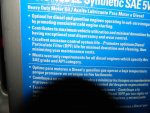Prankster
New member
- 92
- 0
- 0
- Location
- Ponca City, Oklahoma
I like the Rotella 15W40 with a quart of Lucas stabilizer, and a quart of synthetic oil.
The quart of synthetic makes it much easier to start the engine in the winter.
http://www.steelsoldiers.com/deuce-...1-bypass-oil-filters-get-small-particles.html
The quart of synthetic makes it much easier to start the engine in the winter.
http://www.steelsoldiers.com/deuce-...1-bypass-oil-filters-get-small-particles.html
Last edited:




